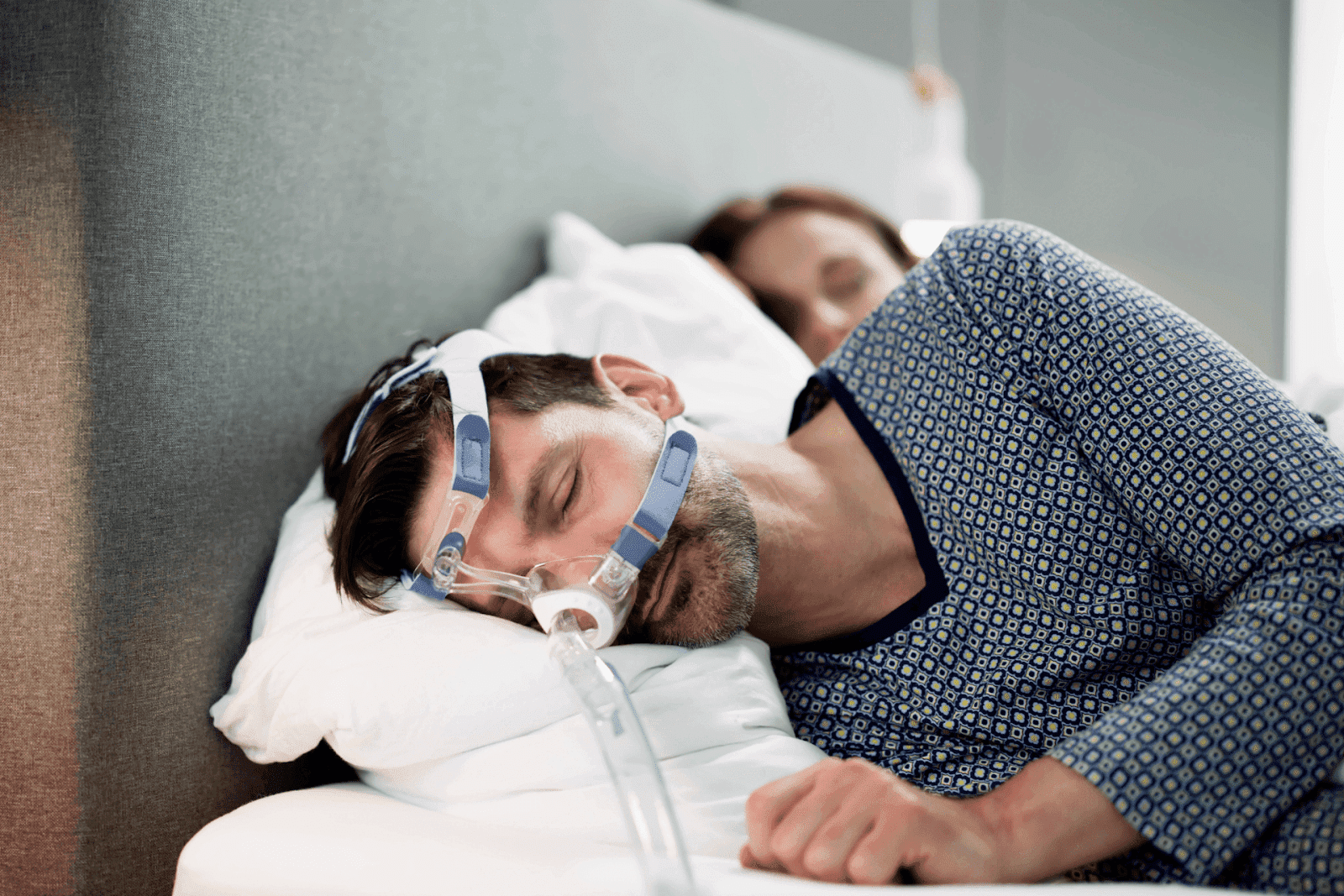Tirzepatide for Sleep Apnea - Can It Help?
Understanding Sleep Apnea and Its ChallengesSleep apnea is a common yet serious sleep disorder characterized by repeated interruptions in breathing during sleep. These pauses [...]
Read More
Medically reviewed by Alan Lucks | MD, Alan Lucks MDPC Private Practice - New York on October 28th, 2025.
The FDA approved Zepbound (tirzepatide) in December 2023 as the first GLP-1 medication specifically indicated for moderate to severe obstructive sleep apnea in adults with obesity (BMI ≥30).
Clinical trials show patients achieve 15-20% body weight reduction on average, which directly decreases fat deposits around the pharynx and tongue base that collapse during sleep.
Even modest weight loss of 10% can reduce the apnea-hypopnea index (AHI) by 26-30%, potentially moving patients from severe (AHI >30) to moderate or mild categories.
The dual GIP/GLP-1 receptor mechanism not only suppresses appetite but may also improve upper airway muscle tone and reduce inflammation in respiratory tissues.
Combination therapy with CPAP shows superior outcomes—patients using both treatments achieve 40-50% greater AHI improvements compared to either intervention alone.
Sleep apnea is a common yet serious sleep disorder characterized by repeated interruptions in breathing during sleep. These pauses can last from a few seconds to minutes and often result in fragmented, poor-quality sleep. The most prevalent form, obstructive sleep apnea (OSA), occurs when throat muscles intermittently relax and block the airway. Symptoms include loud snoring, daytime fatigue, morning headaches, and difficulty concentrating. Left untreated, sleep apnea can increase the risk of heart disease, stroke, high blood pressure, and diabetes.
Managing sleep apnea typically involves lifestyle changes, use of continuous positive airway pressure (CPAP) devices, oral appliances, or surgery. However, many patients struggle with adherence to CPAP therapy or find other treatments invasive or ineffective. This has led researchers and clinicians to explore alternative or complementary therapies that address underlying causes, such as obesity and metabolic dysfunction, which are closely linked to sleep apnea severity.
In addition to these conventional treatments, lifestyle modifications can play a crucial role in managing sleep apnea. Weight loss is often recommended, as even a modest reduction in body weight can significantly decrease the severity of the condition. Incorporating regular physical activity, adopting a balanced diet rich in fruits, vegetables, and whole grains, and avoiding alcohol and sedatives before bedtime can also contribute to improved sleep quality. Furthermore, establishing a consistent sleep schedule and creating a restful sleep environment can help mitigate some of the symptoms associated with sleep apnea.
Emerging research is also focusing on the role of sleep hygiene and cognitive behavioral therapy (CBT) in treating sleep apnea. CBT can help patients develop healthier sleep patterns and address any anxiety or stress that may exacerbate their condition. Additionally, studies are investigating the impact of positional therapy, which encourages patients to sleep on their sides rather than their backs, as this can often alleviate airway obstruction. As our understanding of sleep apnea evolves, a more holistic approach that combines medical, behavioral, and lifestyle interventions may offer hope for those affected by this complex disorder.
 What Is Tirzepatide?
What Is Tirzepatide?Tirzepatide is a novel medication initially developed for the treatment of type 2 diabetes. It is a dual glucose-dependent insulinotropic polypeptide (GIP) and glucagon-like peptide-1 (GLP-1) receptor agonist. By activating these receptors, tirzepatide helps regulate blood sugar levels and promotes weight loss. Clinical trials have shown it to be highly effective in improving glycemic control and reducing body weight, outperforming many existing diabetes medications.
Given the strong connection between obesity and sleep apnea, tirzepatide’s weight loss effects have sparked interest in its potential to improve sleep apnea symptoms. Excess weight contributes to airway obstruction by increasing fat deposits around the neck and throat, worsening apnea episodes. Therefore, medications that promote significant and sustained weight loss may help reduce the severity of sleep apnea.
In addition to its primary functions, tirzepatide has been observed to have a favorable impact on cardiovascular health, which is particularly important for individuals with type 2 diabetes who are at a higher risk for heart-related issues. Studies have indicated that tirzepatide not only aids in weight loss but may also lower blood pressure and improve lipid profiles. This multifaceted approach to treatment underscores the potential of tirzepatide as a comprehensive option for managing diabetes and its associated complications.
Moreover, the mechanism of action for tirzepatide is fascinating. By mimicking the body's natural hormones that regulate appetite and insulin secretion, it creates a feeling of fullness, which can lead to reduced caloric intake. This hormonal interaction not only helps in managing diabetes but also addresses one of the underlying issues of obesity. As researchers continue to explore tirzepatide's effects, there is growing optimism about its role in broader metabolic health, potentially paving the way for new therapeutic strategies in treating obesity and related disorders.
Weight loss is one of the most effective ways to improve or even resolve obstructive sleep apnea. Studies show that losing as little as 10% of body weight can lead to meaningful reductions in apnea severity. Tirzepatide’s ability to induce substantial weight loss, often exceeding 15% of body weight in clinical trials, makes it a promising candidate for sleep apnea management.
By reducing fat deposits around the upper airway, tirzepatide may decrease airway collapsibility during sleep. This can lead to fewer apnea episodes and better oxygenation. Additionally, weight loss can improve lung function and reduce inflammation, further supporting better sleep quality.
Sleep apnea is frequently associated with insulin resistance and metabolic syndrome. Tirzepatide’s dual action improves insulin sensitivity and glucose metabolism, which may indirectly benefit sleep apnea patients. Improved metabolic health can reduce systemic inflammation and oxidative stress, factors that contribute to sleep-disordered breathing.
Tirzepatide, marketed as Zepbound, is approved for moderate to severe sleep apnea treatment in adults with obesity. Its metabolic benefits combined with weight loss effects present a compelling case for its role in a comprehensive sleep apnea plan.
Research directly examining tirzepatide’s effects on sleep apnea is still emerging. Most evidence comes from studies focused on diabetes and obesity, where secondary analyses suggest improvements in sleep-related symptoms following weight loss. Early clinical observations indicate that patients treated with tirzepatide report better sleep quality and reduced daytime sleepiness.
Experts recommend cautious optimism. Tirzepatide may serve as an adjunct to traditional sleep apnea treatments, especially for patients struggling with obesity. Ongoing and future studies will help clarify its safety, efficacy, and optimal use in sleep apnea management.
If you suspect you have sleep apnea or are interested in exploring tirzepatide as part of your treatment plan, consulting a healthcare professional is essential. Telehealth services, such as Doctronic.ai, offer convenient access to licensed doctors who can evaluate your symptoms, provide personalized advice, and discuss medication options, including tirzepatide.
Doctronic.ai stands out by combining the latest AI-driven medical expertise with real human doctors available 24/7 across all 50 states. This innovative platform provides quick, affordable telehealth visits under $40, making it easier than ever to get timely medical guidance from the comfort of your home. Whether you need a diagnosis, a second opinion, or ongoing care, Doctronic.ai leverages advanced AI to deliver smarter, faster, and more personal healthcare.
Tirzepatide should be part of a holistic approach to managing sleep apnea. This includes lifestyle modifications such as weight loss through diet and exercise, avoiding alcohol and sedatives before bedtime, and using prescribed devices like CPAP machines when indicated. Regular follow-up with healthcare providers ensures treatment effectiveness and safety.
Patients interested in tirzepatide should discuss potential benefits and risks with their doctors. Factors such as medical history, other medications, and specific sleep apnea severity will influence treatment decisions. Telehealth platforms like Doctronic.ai can facilitate these discussions, offering expert advice and easy access to prescriptions when appropriate.
Advances in pharmacotherapy like tirzepatide represent an exciting frontier in sleep apnea care. As research progresses, medications targeting metabolic pathways may become integral to treatment plans, especially for patients with obesity-related sleep apnea. Combining AI-powered telehealth services with cutting-edge therapies promises to enhance patient outcomes and accessibility.
Ultimately, managing sleep apnea effectively requires a personalized approach that addresses both symptoms and underlying causes. Tirzepatide offers hope for many, but it is one piece of a complex puzzle. Staying informed and working closely with healthcare professionals ensures the best possible care and improved quality of life.
 Empowering Your Health Journey
Empowering Your Health JourneySleep apnea can significantly impact daily life, but innovative treatments like tirzepatide offer new avenues for relief. To explore your options, consider consulting with medical experts through reliable telehealth platforms such as Doctronic.ai. With AI-enhanced diagnostics and compassionate care available anytime, anywhere, managing sleep apnea has never been more accessible.
Taking proactive steps today can lead to better sleep, improved health, and greater well-being tomorrow.
Ready to take control of your sleep apnea with the power of AI? Doctronic offers a revolutionary approach to healthcare, providing free AI doctor visits that synthesize the latest medical research to address your concerns. Experience smarter, faster, and more personal care with our AI that remembers every detail about you. For comprehensive care, our telehealth video visits connect you with real doctors 24/7 in all 50 states, at an affordable price. Join over 10 million satisfied users and skip the line to talk to an AI Doctor now, for free.
Zepbound represents a breakthrough as the first weight-loss medication specifically approved for sleep apnea, offering clinically meaningful improvements when combined with traditional therapies like CPAP. The substantial weight loss it provides directly addresses the root cause of obstruction in obese patients. If you're struggling with sleep apnea and obesity, Doctronic can help evaluate whether this treatment approach fits your specific situation.
Understanding Sleep Apnea and Its ChallengesSleep apnea is a common yet serious sleep disorder characterized by repeated interruptions in breathing during sleep. These pauses [...]
Read More